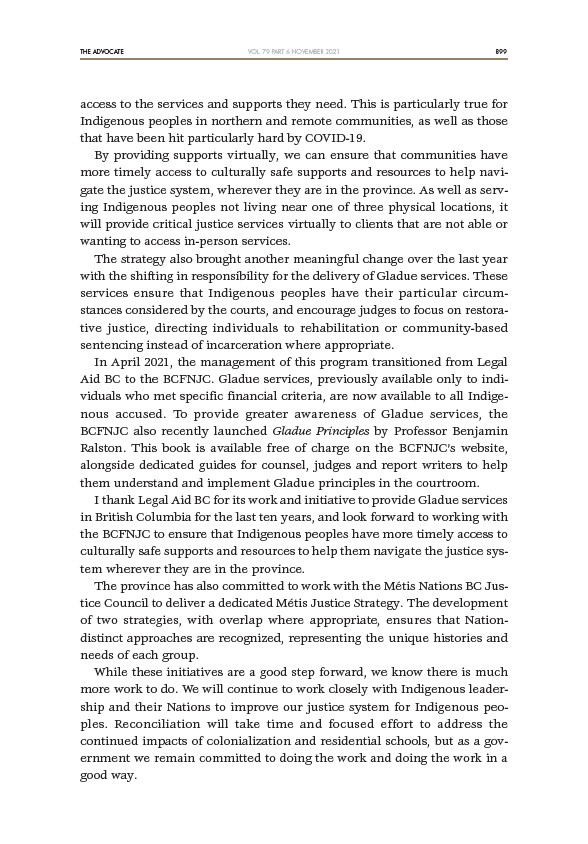
THE ADVOCATE 899
VOL. 79 PART 6 NOVEMBER 2021
access to the services and supports they need. This is particularly true for
Indigenous peoples in northern and remote communities, as well as those
that have been hit particularly hard by COVID-19.
By providing supports virtually, we can ensure that communities have
more timely access to culturally safe supports and resources to help navigate
the justice system, wherever they are in the province. As well as serving
Indigenous peoples not living near one of three physical locations, it
will provide critical justice services virtually to clients that are not able or
wanting to access in-person services.
The strategy also brought another meaningful change over the last year
with the shifting in responsibility for the delivery of Gladue services. These
services ensure that Indigenous peoples have their particular circumstances
considered by the courts, and encourage judges to focus on restorative
justice, directing individuals to rehabilitation or community-based
sentencing instead of incarceration where appropriate.
In April 2021, the management of this program transitioned from Legal
Aid BC to the BCFNJC. Gladue services, previously available only to individuals
who met specific financial criteria, are now available to all Indigenous
accused. To provide greater awareness of Gladue services, the
BCFNJC also recently launched Gladue Principles by Professor Benjamin
Ralston. This book is available free of charge on the BCFNJC’s website,
alongside dedicated guides for counsel, judges and report writers to help
them understand and implement Gladue principles in the courtroom.
I thank Legal Aid BC for its work and initiative to provide Gladue services
in British Columbia for the last ten years, and look forward to working with
the BCFNJC to ensure that Indigenous peoples have more timely access to
culturally safe supports and resources to help them navigate the justice system
wherever they are in the province.
The province has also committed to work with the Métis Nations BC Justice
Council to deliver a dedicated Métis Justice Strategy. The development
of two strategies, with overlap where appropriate, ensures that Nation-
distinct approaches are recognized, representing the unique histories and
needs of each group.
While these initiatives are a good step forward, we know there is much
more work to do. We will continue to work closely with Indigenous leadership
and their Nations to improve our justice system for Indigenous peoples.
Reconciliation will take time and focused effort to address the
continued impacts of colonialization and residential schools, but as a government
we remain committed to doing the work and doing the work in a
good way.